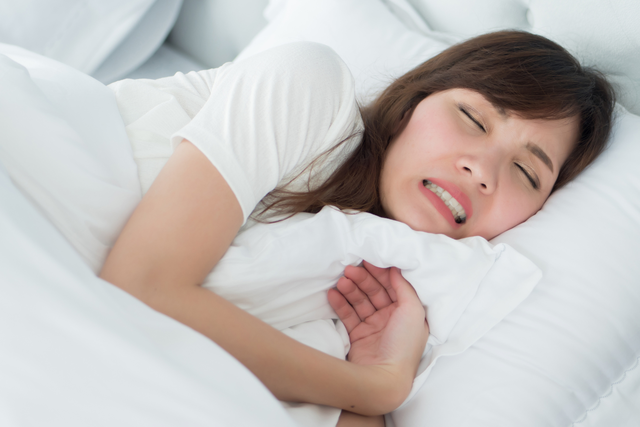Intensive teeth grinding, also called bruxism, can make a lot of trouble. In most cases, people are not even aware that they do this, because it occurs in their sleep. They might realise they have a problem once they experience the side effects like headache, jaw pain, and damaged teeth. However, teeth grinding does also occur in an awake state, but people can still be unaware of it. It is present in both children and adults. This habit only causes unnecessary physical and mental health problems, and there are several ways of correcting it. Here is what you can do to help yourself stop grinding your teeth in sleep.
Reduce the stress
One of the first steps you have to take to get rid of teeth grinding is to reduce stress as much as possible. Whether it is an argument with a significant other, money problems or simply anxiety, it can all be a potential cause of bruxism. Neglecting a problem is never a solution so it’s best for you to try out some techniques to relieve stress. For example, listening to your favourite music or taking a warm bath before bed can be enough to help you feel calm and sleep without clenching your jaw. If you’re into spiritual stuff, consider meditation or yoga. Both can help you focus on your thoughts and clear your mind. Observe your problems realistically and try to learn how to deal with stress more effectively. If you are on the other hand, feeling overwhelmed or like you are reaching a breaking point, it’s best to reach out to your counsellor.
Try out other relaxing methods
If you consider yourself a strong, independent adult that has the power to keep everything under control, there are some more relaxing things you can do. Regular exercise might prove even more efficient in reducing stress levels. Not only does it relax your muscles, but it also makes you feel calm afterwards. Furthermore, you can target the jaw specifically by saying the letter “N” out loud, or just opening your mouth while touching your front teeth with your tongue. When you go to bed, press a warm wet towel against your jaw, or massage your jaw and temples. Warmth and applied pressure will alleviate the pain and relax your masticatory muscles. Additionally, there are ways to prevent stiffness in your jaw muscles. Avoid caffeine and alcohol, especially before bed. And definitely lose the habit of chewing pen caps and anything else that isn’t food.
Get a mouthguard
Waking up every morning with pain in your jaw and teeth can be exhausting and prevent you from enjoying your day. Don’t forget that constant clenching of your teeth will eventually take its toll on your dental health. Pain in your jaw may go on its own several hours after you get up, however, that doesn’t mean that the consequences can’t be permanent. Tooth surfaces and enamel will become worn down and this will cause increased tooth sensitivity. If you already have crowns or bridges, they will also experience damage, too. Also, in some severe cases, bruxism may even lead to a loss of a tooth. In order to prevent any of these inconveniences, consider sleeping with a mouthguard. Mouthguards cover your teeth and protect them from grinding against each other during sleep.
Make a dentist appointment
Visiting your dentist is probably the best idea if you suspect that you have bruxism. Symptoms you may experience include sensitive teeth, headaches, and pain in your jaw and ear. These symptoms come not only from damaged teeth but also from disorders of the temporomandibular joint (TMJ). Dentists do check for signs of bruxism during regular checkups anyway. Other than chipped or worn-down teeth, signs of bruxism may include damage to your inner cheek, stiffness of jaw muscles, and misaligned teeth. Your dentist can then fix the damage by filling cavities and replacing missing teeth with implants or dentures. If you have crowned or crooked teeth, your dentist might suggest reductive coronoplasty. This means reshaping and levelling the biting surfaces of upper and lower teeth rows. Additive coronoplasty is the opposite method, adding to the biting surfaces of teeth where needed.
Seek out advanced treatment
If your teeth grinding is severe, a medical professional can inject your masseters with Botox. It is a weakened toxin of the bacterium Clostridium botulinum, usually used in cosmetic treatment. Injected into your masticatory muscles, it will relax your muscles and reduce the teeth grinding. The effect wears out after 3 or 4 months, so you will need repeated injections. This does not solve the problem, though. You might need to consult your doctor to prescribe you antidepressants or sedatives if you’re battling depression or anxiety. Apart from medication, there is a biofeedback method. An electromyography machine registers impulses from masticatory muscles and gives the patient auditory or visual feedback. It helps patients get more conscious about clenching their jaw and allows them more control over their movements.
Adults don’t usually grind their teeth so hard that they need treatment. Children will often experience bruxism when the new teeth emerge, and they will usually stop after the teeth have set in. However, if there’s a need for treatment, make sure to act on time before any complication happens.


